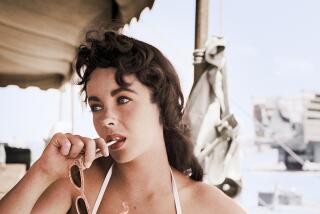A memoir that’s more like an inventory of life events
WRITERS often lament an ongoing problem. Go to a cocktail party and the minute guests learn you’re a writer, they tell you about the novel (or screenplay or memoir) they’ve been meaning to write for some time now. They just need to commit their great idea to paper. There’s no mention of learning the writer’s craft nor what it takes to shape a narrative. If they can talk, surely they can write.
One might surmise that actors experience similar frustrations. From a layperson’s standpoint, all actors have do is walk onto a stage or a film set and emote. Right? Certainly, those of us who’ve lived a few years should be able to do that. But as Oscar- and Tony Award-winning actress Ellen Burstyn makes abundantly clear in “Lessons in Becoming Myself,” it took years of training to develop her craft. She started out with heaps of raw talent, growing up in Detroit during the Depression. She left home at 18 and soon landed on Broadway with nary a hint of training. But she took the seeds of talent and worked like mad to develop herself and her technique, ultimately starring in such acclaimed films as “The Last Picture Show,” “Alice Doesn’t Live Here Anymore” and “Same Time, Next Year.” It wasn’t just luck and good looks that brought her this success; it was craft.
In this memoir, Burstyn takes readers through the many harrowing steps she followed to master her craft (including her work with Lee Strasberg of the Actors Studio), to master her personal life (an abusive mother, a schizophrenic husband, failed marriages and many affairs) and ultimately the spiritual journey she undertook (with jaunts to the Swiss Alps, the Himalayas and Cambodia) to become fully and truly her unique self.
For readers who are fascinated by Burstyn (born Edna Rae Gillooly and known professionally as Ellen McRae until 1970, when she took the name of her third husband) or entranced by the subject of how an actor becomes versed in her trade, the diary-like narrative with its ongoing inventory of life details may suffice.
But for those who are looking to be brought into an experience, to be entranced by the emotional truth of her life’s journey, the narrative falls flat. And craft, simply, is the reason why. (It may seem unfair to criticize a gifted actress for not being a better writer, but when we’re holding the book in our hands, all we have to go by is what’s on the page. Perhaps a firmer editing hand might have helped.)
If a writer paints a vivid scene, she need not tell us what it means. We will come to that realization on our own if the painting has been done carefully and artfully. In fact, this awakening to a story’s deeper message is one of the greatest joys of reading, the feeling that we’ve penetrated a mystery. A particular life and the chaos surrounding it begin to make sense to us, and we participated in that alchemy.
In “Lessons in Becoming Myself,” Burstyn does the opposite, telling rather than showing, summing her experiences up in a mind-numbing recitation of detail after detail with a self-help, New Age, psychobabble feel. “That was the problem -- my mother never saw me as a separate person.” Or, working with Lee Strasberg: “I could be whatever I am. I could ... I could.... He said I could even ... be
In this memoir, we’re left listening to a melange of happy, lurid, painful and mundane events that mean something to the author but fail to touch emotional chords in a reader. It’s a solo performance.
“I had disassociated. I had separated from my body. It was too painful to be in it. This was the first time I experienced this, but unhappily for me it would not be my last.”
Part of the problem is that Burstyn encounters her readers assuming that we’re already fascinated by the subject and need only be told the minutiae of her life to feel sated. That assumption may pull readers in for a bit, given her celebrity, but it’s not enough to sustain nearly 500 pages. Alas, her story, which could have been quite powerful given its rags-to-riches quality, devolves into an episodic soap opera crowded with lackluster drama.
*
Bernadette Murphy, author and editor of three books of creative nonfiction, teaches creative writing at Antioch University.
More to Read
Sign up for our Book Club newsletter
Get the latest news, events and more from the Los Angeles Times Book Club, and help us get L.A. reading and talking.
You may occasionally receive promotional content from the Los Angeles Times.







